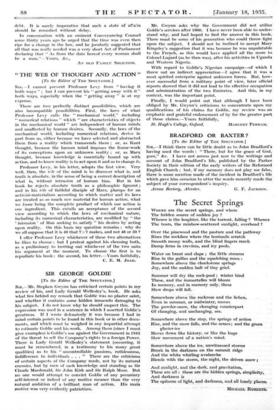SIR GEORGE GOLDIE [To the Editor of THE SPECTATOR.] SIR, —Mr.
Stephen Gwynn has criticized certain points in my review of his, and Lady Gerald Wellesley's, book. He asks what lies behind my remark that Goldie was no plaster saint, and whether it contains some hidden innuendo damaging to his subject. I do not know why he should suspect this. The expression was used in a sentence in which I asserted Goldie's greatness. If I wrote defensively it was because I had in mind certain points to be found in this book or in other docu- ments, and which must be weighed in any impartial attempt to estimate Goldie and his work. Among them (since I must give examples) is Goldie's use against the Government in 1885 of the threat to sell the Company's rights to a foreign Power. There is Lady Gerald Wellesley's statement (occurring, it must be remembered, in a testimony to his many great qualities) as to his " uncontrollable passions, ruthlessness, indifference to individuals . . . " There are the criticisms of certain aspects of the Company made, not by its natural enemies, but by men of such knowledge and standing as Sir Claude Macdonald, Sir John Kirk and Sir Ralph Moor. But no one would attempt to convict Goldie of any pecuniary self-interest or indeed of any motive meaner than the very natural ambition of a brilliant man of action. His main motive was very evidently patriotism.
Mr. Gwynn asks why the Government did not utilize Goldie's services after 1900. I have never been able to under- stand why, and had hoped to find the answer in this book. There must be some of his generation who could throw light upon the subject. I should not be inclined to accept Mary Kingsley's suggestion that it was because he was unpalatable to the French, as this would have applied all the more to Colonel Lugard (as he then was), after his activities in Uganda and Western Nigeria.
With regard to Goldie's Nigerian campaign—of which I threw out an indirect appreciation—I agree that it was a most spirited enterprise against unknown forces. But, how- ever successful from a military point of view, later official reports showed that it did not lead to the effective occupation and administration of the two Emirates. And this, in my context, was the important point.
Finally, I would point out that although I have been obliged by Mr. Gwynn's criticisms to concentrate upon my qualifications of his claims for Goldie, my review was an emphatic and grateful endorsement of by far the greater part of those claims.—Yours faithfully,






































 Previous page
Previous page